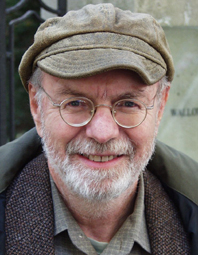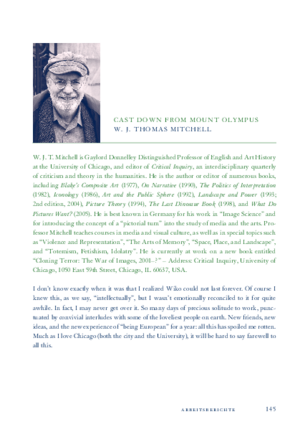
W.J. Thomas Mitchell, Ph.D.
Professor of English and Art History
University of Chicago
Born in 1942 in Anaheim, CA, USA
Studied English at Michigan State University and at Johns Hopkins University, Baltimore
Focus
Image Science
Project
Medium Theory
The aim of this project is not merely to provide an abstract conceptual scheme for the description of media, but to raise the question of what mediates theory as such: in what medium can we theorize a medium? This line of thinking is already anticipated in the chapter entitled "Metapictures" in Picture Theory, and it will, I hope, move toward a more generalized reflection on the way we understand the world of images and texts we create around ourselves. Among the questions this project will address are the following:1) How can we think the relation between singularity (medium) and plurality (media) in media theory, between the so-called "specificity" of a medium, and the ineluctably hybrid, mixed character of media?
2) What is the role of technical determination and innovation in media? Why are so many mediums (even archaic ones like writing) characterized in mythic narratives of invention and gifts from the gods?
3) Are media innovations best characterized as "radical" (changing the way people experience the world) or "conservative" (preserving and reproducing long-standing forms of experience) or both?
4) How do media manifest themselves in stereotypical avatars and mediascapes, so that individual historical personages (most notoriously Marshall McLuhan) become "media" in themselves, oracles that articulate gnomic messages?
5) How can we best describe the phenomena of "nesting" and "braiding" in media, the concentric framing of one medium inside another, and the adjacency of media in mixed forms?
6) What do works of "meta-media", films about films, paintings about painting, texts about writing, contribute to the theorizing of media?
7) Are media best pictured as conduits or environments, as things "through which" messages pass from a sender to receiver, or as habitats "in which" images and forms come to life?
Recommended Reading
Mitchell, W. J. Thomas. Iconology: Image, Text, Ideology. Chicago, IL: University of Chicago Press, 1986.
-. Picture Theory: Essays on Verbal and Visual Representation. Chicago, IL: University of Chicago Press, 1994.
-. The Last Dinosaur Book: Life and Times of a Cultural Icon. Chicago, IL: University of Chicago Press, 1998.
Colloquium, 08.12.2004
Addressing Media or: Why I Scream at my Television Set
I had hoped to present in this lecture an incisive analysis of the deplorable condition of the mass media in the United States at the present time: its lack of independence and investigative aggressiveness in the face of government manipulation; its reduction of crucial political debates to clichés and sound-bites; its complicity in leading the U.S. into Iraq; and its utter failure to tell the truth about the disastrous consequences of the war there. But I suspect that you already know all about that, and that you are, like me, also screaming at your television sets, or throwing the newspaper across the room.
So instead of ranting about media bias, I want to investigate the impulse to rant in the first place. Is this a case of "blaming the messenger"? Are we mis-directing our rage? How could we think of media in a way that allowed us not to get mad, but to get even-that is, to reverse the tide of political manipulation of the media which seems to be flowing so steadily toward right wing control and a decline of professional journalism? Could we imagine a "general theory" of media that might give us a more complex and systematic overview of these tendencies?
I want to suggest an approach to media grounded in "metapictures" of media-scenes in which media show or expose themselves to view as faces or places, personal avatars of media, on the one hand, and locations or environments on the other. My hope is that these two kinds of metapictures will help us to "address media" (in the double sense of hailing or "addressing" it, and locating or placing it). This may not give us a general theory of media, but it might lead toward something I call "medium theory," a practice of reflection immersed in the middle of a variety of media institutions.
Eveningcolloquium , 05.04.2005
Cloning Terror: The War of Images, 2001-2004
Publications from the Fellow Library
Mitchell, W.J. Thomas (200405)
Mitchell, W.J. Thomas (Chicago, London, 2015)
Mitchell, W.J. Thomas (2009)
Pictorial versus iconic turn : two letters
Mitchell, W.J. Thomas (2007)
Mitchell, W.J. Thomas (Chicago, Ill., 2005)
What do pictures want? : the lives and loves of images
Mitchell, W.J. Thomas (2005)
Mitchell, W.J. Thomas (2005)
Secular divination : Edward Said's humanism
Mitchell, W.J. Thomas (2005)
Edward Said : continuing the conversation
Mitchell, W.J. Thomas (2004)
Medium theory : preface to the 2003 Critical Inquiry symposium
Mitchell, W.J. Thomas (2004)
